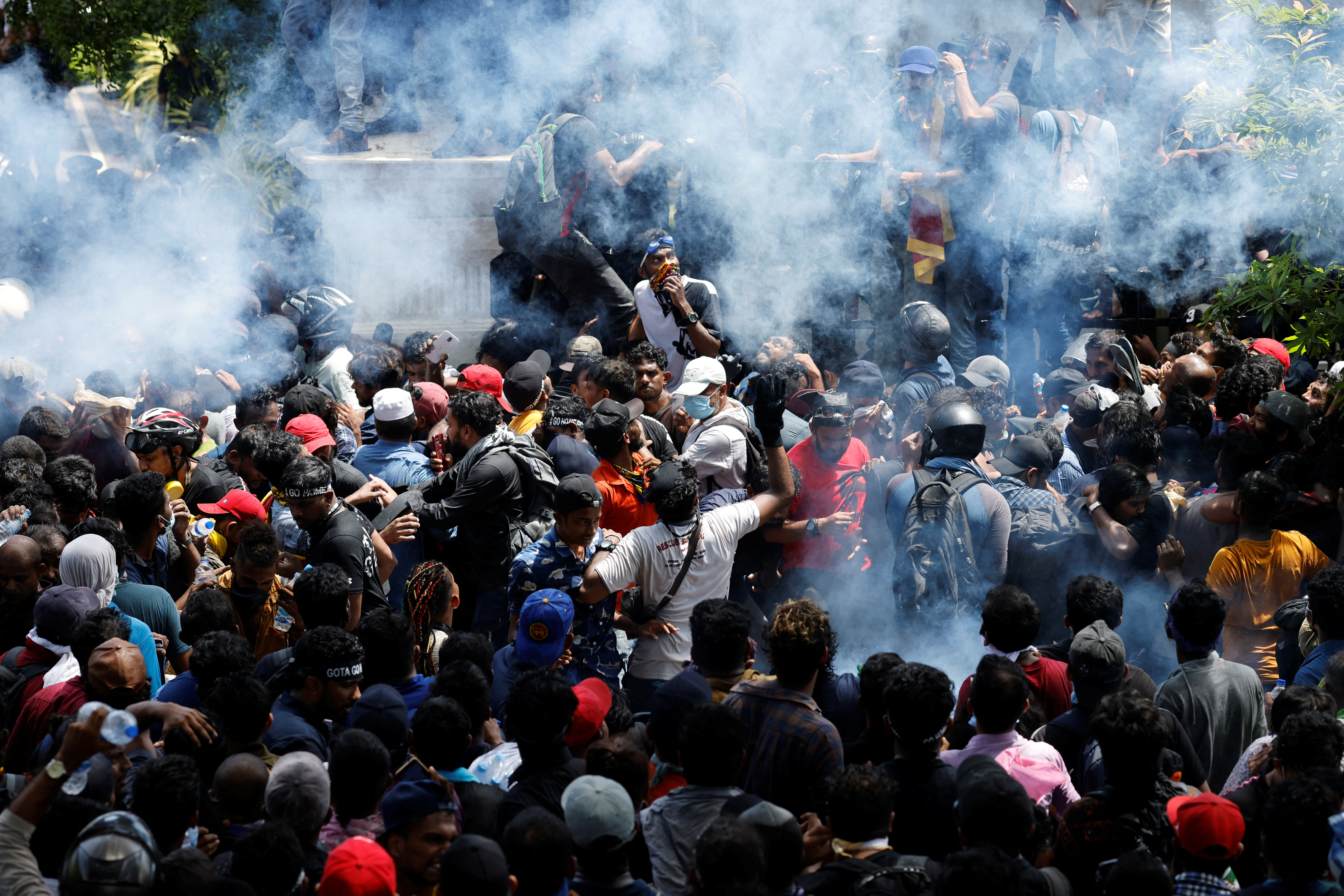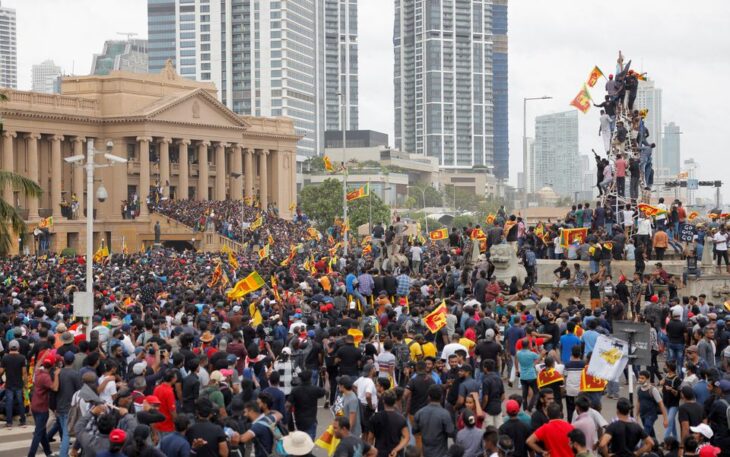COLOMBO, July 13 – Sri Lankan President Gotabaya Rajapaksa fled to the Maldives on Wednesday,bringing to an apparent end his family’s near two-decade dominance of the country after a massive popular uprising brought on by an economic collapse.
But his decision to leave his ally Prime Minister Ranil Wickremesinghe in charge as acting president triggered more demonstrations, with protesters storming the premier’s office demanding that he go too.Advertisement · Scroll to continueReport an ad
Wickremesinghe’s office initially declared a state of emergency and a curfew with immediate effect, then cancelled them but said the measures would be announced again later.

Police stationed outside the prime minister’s office fired several rounds of tear gas and a military helicopter briefly circled overhead, but protesters appeared undeterred and finally surged into the compound. Wickremesinghe’s team declined to reveal his whereabouts.Advertisement · Scroll to continue
“It feels pretty marvellous, people were trying to take this place for about three hours,” said college student Sanchuka Kavinda, 25, standing next to a mangled, open gate of the prime minister’s office. “No matter what, everyone in this crowd will be here until Ranil also steps down.”
In a statement, Wickremesinghe said the protesters “have no reason to storm the prime minister’s office”.
“They want to stop the parliamentary process. But we must respect the Constitution. So security forces have advised me to impose an emergency and a curfew. I’m working to do that.”Advertisement · Scroll to continue
On the lower floor of the two-storied, whitewashed colonial-era building, dozens of protesters gathered to sing Sinhala pop songs. In a nearby air-conditioned room, sat a large group of security personnel armed with assault rifles.
Protest organisers and security personnel manned a central wooden staircase at the heart of the building, guiding sightseers to and from the upper floor where the prime minister’s room is located.
At an adjoining room on the top floor, where Reuters interviewed Wickremesinghe a few weeks ago, the plush furniture had been hastily pushed to the corners and a line of armed security personnel ushered visitors through.

Parliament is expected to name a new full-time president next week, and a top ruling party source told Reuters Wickremesinghe was the party’s first choice, although no decision had been taken.
An attempt by Wickremesinghe to cling on would infuriate the protesters who say he is a close ally of the Rajapaksa family, which has dominated the country since Rajapaksa’s older brother Mahinda became president in 2005.

“An MP with one seat is appointed as PM. Now the same person is appointed as acting President,” the opposition presidential nominee, Sajith Premadasa, said on Twitter. “This is the Rajapaksa style of democracy. What a farce. What a tragedy.”
The president, his wife and two bodyguards left the main international airport near Colombo aboard an air force plane early on Wednesday, the air force said in a statement.
The parliament speaker, Mahinda Yapa Abeywardena, said Rajapaksa had phoned him and told him his resignation letter would arrive later on Wednesday.
A government source and a person close to Rajapaksa said he was in Male, the capital of the Maldives. The president would most likely proceed to another Asian country from there, the government source said.
Protests against the economic crisis have simmered for months and came to a head last weekend when hundreds of thousands of people took over key government buildings in Colombo, blaming the Rajapaksas and their allies for runaway inflation, shortages and corruption.
Government sources and aides said the president’s brothers, former president and prime minister Mahinda Rajapaksa and former finance minister Basil Rajapaksa, were still in Sri Lanka.
Wickremesinghe, whose private residence in Colombo was set ablaze on Saturday, had offered to resign as prime minister but did not repeat that offer after he became acting president on Wednesday. If he does go, the speaker would be acting president until a new president is elected on July 20 as scheduled.
Amid the economic and political chaos, Sri Lanka’s sovereign bond prices hit fresh record lows on Wednesday.
The U.S. Embassy in Colombo, which is in the central district of the city, said it was cancelling consular services for the afternoon and for Thursday as a precautionary measure.
The island nation’s tourism-dependent economy was hammered first by the COVID-19 pandemic and then a fall in remittances from overseas Sri Lankans. A ban on chemical fertilisers hit output although the ban was later reversed.
The Rajapaksas implemented populist tax cuts in 2019 that hurt government finances, while shrinking foreign reserves curtailed imports of fuel, food and medicines.
Petrol has been severely rationed and long lines have formed in front of shops selling cooking gas. Headline inflation hit 54.6% last month and the central bank has warned that it could rise to 70% in coming months.
Mahinda Rajapaksa, president from 2005-2015 and later prime minister under his brother, resigned in May after protests against the family turned violent. He remained in hiding at a military base in the east of the country for some days before returning to Colombo.
On Tuesday, Sri Lankan immigration officials prevented Basil Rajapaksa, who quit in April as finance minister, from flying out of the country.
Want to send us a story? Contact Shahidi News Tel: +254115512797 (Mobile & WhatsApp)


